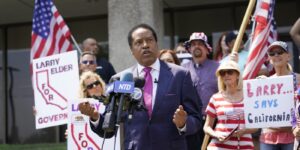Offering voters the chance to recall California Gov. Gavin Newsom goes against the U.S. Constitution’s “one person, one vote” legal standard, a new lawsuit claims.
The recall election is slated to take place Sept. 14, and many voters have already received absentee ballots.
The lawsuit, filed by two eligible voters, seeks to stop the election.
The six-page filing claims that recall elections run counter to constitutional requirements, including that votes must “be of equal weight and power.”
But the recall provision in the California Constitution “does not establish a way for votes to be of equal weight and power, since the state officer sought to be recalled specifically is prohibited for running and cannot run to replace her/himself,” the suit states. “Most importantly, it creates a situation in which a larger plurality can support keeping the elected officer in office, while a smaller plurality has more say in whom the successor would be.”
Plaintiffs asked the court to declare the upcoming election unconstitutional. They want the election blocked until the matter is decided.
Ballots for the election have two questions. One asks whether the voter wants to recall California Gov. Gavin Newsom, a first-term Democrat. The other inquires who the voter would choose to replace Newsom if he is recalled.
A simple majority vote would recall Newsom; his replacement would be whomever receives the most votes out of the field.
No major Democrats are on the ballot, a decision the party made to try to solidify support for keeping Newsom in office.
Top Republicans include EpochTV host Larry Elder, state Rep. Kevin Kiley, and businessman John Cox.
Several legal scholars have argued recently that the recall election is unconstitutional, despite it being enshrined in the state Constitution.
“By conducting the recall election in this way, Mr. Newsom can receive far more votes than any other candidate but still be removed from office. Many focus on how unfair this structure is to the governor, but consider instead how unfair it is to the voters who support him,” Erwin Chemerinsky, dean of the University of California, Berkeley’s School of Law, and Aaron Edlin, professor of law at the school, wrote in a recent op-ed.
They envisioned a scenario in which 10 million people voted in the election, with 5,000,0001 voting to remove Newsom. If Elder was the top vote-getter, then he could win with a tally of less than half, such as 1.8 million votes.
“Mr. Newsom would have the support of almost three times as many voters, but Mr. Elder would become the governor. That scenario is not a wild hypothetical. Based on virtually every opinion poll, Mr. Newsom seems likely to have more votes to keep him in office than any other candidate will receive to replace him. But he may well lose the first question on the recall, effectively disenfranchising his supporters on the second question,” the scholars wrote.
“This is not just nonsensical and undemocratic. It is unconstitutional. It violates a core constitutional principle that has been followed for over 60 years: Every voter should have an equal ability to influence the outcome of the election.”
Among the solutions they proposed: adding Newsom’s name to the second question. If that happened, voters could hypothetically remove Newsom but vote to replace him with himself.
Democrats fear a Newsom recall in part because another Democrat was recalled in California. Gray Davis was removed from office in 2003 by 55 percent of voters. He was replaced by Arnold Schwarzenegger, who earned nearly 49 percent of the vote.
Critics panned the new lawsuit, with some attempting to link it to Newsom.
“There it is. A federal lawsuit has just been filed to cancel the Recall vote. Newsom knows he’s lost,” Kiley wrote on Twitter.
“Sheer drivel, this lawsuit is,” Harmeet Dhillon, a Republican National Committee committeewoman for California, added.
The suit names Shirley Weber, the California secretary of state, as the defendant.
Weber’s office and the office of California Attorney General Rob Bonta, a Democrat, did not respond to early morning requests for comment.
Stephen Yagman, a lawyer for the plaintiffs, told the court that an official from Bonta’s office told him that the office had not yet decided who would represent Weber.
Bonta told Politico that he was aware of the lawsuit and would be coordinating with Weber’s office.






